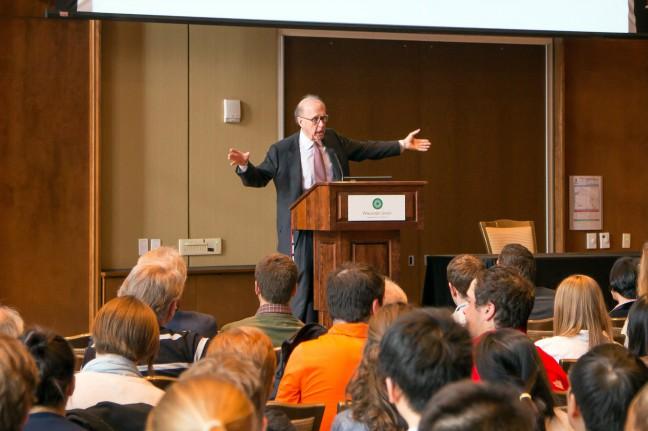Rapid urbanization and a shift away from being the world’s “assembly line” will characterize China’s future growth, an economist said in talk on campus Wednesday.
After spending almost 20 years studying the climb of the Chinese economy on a global scale, University of Wisconsin alumnus Stephen Roach spoke about the economic comparison between the United States and China.
Roach’s talk was the first of the 2014 China and Global Economics Lecture Series organized by the Wisconsin China Initiative. Roach earned his bachelor’s degree in economics at UW. He has worked as a former chair of Morgan Stanley Asia and served as a senior fellow at Yale University’s Jackson Institute of Global Affairs, according to a UW statement.
Roach said he had intended to major in engineering until he took a history course on South Asia, which sparked his interest in economics.
“I was fascinated by economic models built to solve development problems,” he said. “But at that time, there was a cultural revolution in China. Therefore, there was no model of China, so I thought about building one when I was pursuing my doctoral degree.”
After analyzing the confusion surrounding the Asian economic crisis in 1997 and 1998, Roach said he was curious to find out why China’s economy had not suffered as much as other nations like Thailand and Indonesia.
Roach developed a passion for understanding the cross section between the U.S. economy and Chinese economy, and furthermore, he said, the intersection of China and the world.
“I call the economic relationship between China and America an ‘unsustainable codependency,’” Roach said. “It’s an unhealthy reliance on both partners.”
The problem in the U.S. is that consumers spend more than they earn and the country is facing massive deficits, Roach said.
He said it was important for the United States to change the way it views China as the world’s “assembly line.”
“It was all about industry and manufacturing. However, it was the image of old China. The next China is about brilliant services,” Roach said.
Roach quoted China’s former prime minister, saying China looks strong on the surface, but its economy is unstable, unbalanced, uncoordinated and unsustainable.
However, China is changing, Roach said. They are now remaking, rethinking and redirecting and have shifted the model of producer and consumer, he said.
Besides increasing technological services, Roach said China is also going through rapid urbanization. It is reforming its policies to guide the economy for the future, he said.
When U.S. is facing a rising China, it needs to rethink its strategy for economy, Roach said.
“While China is transforming the growth model, U.S. is still using the old strategy — the invisible hand. But it doesn’t work now,” Roach said. “We need to learn to rethink about our economic strategy. Maybe America needs another plan or strategy because China is going on a different path.”


